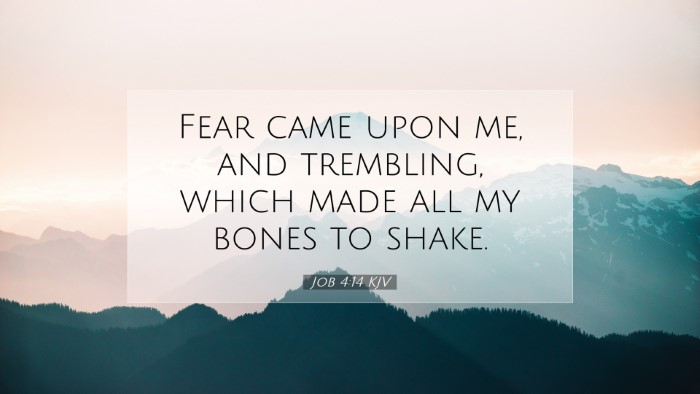Old Testament
Genesis Exodus Leviticus Numbers Deuteronomy Joshua Judges Ruth 1 Samuel 2 Samuel 1 Kings 2 Kings 1 Chronicles 2 Chronicles Ezra Nehemiah Esther Job Psalms Proverbs Ecclesiastes Song of Solomon Isaiah Jeremiah Lamentations Ezekiel Daniel Hosea Joel Amos Obadiah Jonah Micah Nahum Habakkuk Zephaniah Haggai Zechariah MalachiJob 4:14
Job 4:14 KJV
Fear came upon me, and trembling, which made all my bones to shake.
Job 4:14 Bible Commentary
Commentary on Job 4:14
Job 4:14 states: "Fear came upon me, and trembling, which made all my bones to shake." This passage, uttered by Eliphaz the Temanite, introduces profound themes of fear, divine communication, and the human experience of judgment.
Contextual Overview
In the broader narrative of Job, this verse is part of Eliphaz's first response to Job's lamentations during his trials. Eliphaz, an older and more wise character, seeks to impart his insights regarding suffering, the nature of God, and the spiritual reality of mankind. Understanding the context is essential to appreciating the weight of his words.
Insights from Public Domain Commentaries
Matthew Henry's Commentary
Henry provides a comprehensive examination of this verse, highlighting the emotional turmoil that accompanies a divine revelation or experience. He emphasizes that fear, in this context, often signals a moment of impending judgment or confrontation with the divine:
- Fear as a Response to Divine Presence: Henry notes that this fear could signify recognition of God's holiness and the magnitude of human sinfulness.
- The Physical Manifestation of Fear: The trembling and shaking of bones showcase the intense psychological and physical impact of divine encounters.
Henry also reflects on the notion that such moments of fear can serve as a catalyst for repentance and spiritual awakening, urging believers to respond rightly to divine encounters.
Albert Barnes' Commentary
Barnes approaches this verse with a focus on the interpretative implications of fear and trembling. He articulates that:
- Fear as a Universal Human Experience: All humans experience fear, particularly in the presence of something greater than themselves—be it God, nature, or existential threats.
- Challenges of Understanding God: Barnes points out that while fear can drive one towards God, it can also reflect a misunderstanding of God's character and intentions.
- The Nature of Divine Communication: The trembling experienced by Eliphaz implies a truth revelation that unsettled his understanding of existence and God's interaction with the world.
Barnes carefully maintains that while fear is a natural response, it is imperative to balance it with love and awe, as God desires a relationship characterized by trust rather than mere terror.
Adam Clarke's Commentary
Clarke adds a deeper theological exploration of the implications of fear and divine interaction.
- Interpretations of the Encounter: He suggests that the fear Eliphaz experienced was a result of a supernatural encounter that aligned with common biblical experiences of prophets and patriarchs who feared when faced with divine visions.
- Symbolism of Bones Shaking: Clarke interprets the imagery of bones shaking as a metaphor for existential vulnerability and the sense that one's very foundation is being challenged.
- The Role of Dreams and Visions: He also discusses the significance of dreams and visions in ancient descriptions of divine communication, making a point that such experiences often led to fear, but also clarity and purpose.
Clarke encourages readers to embrace the lessons of fear as avenues to greater wisdom and understanding of God's ways. He emphasizes that such trembling should lead one to reverence rather than despair.
Theological Themes and Implications
When we synthesize the insights from these commentaries, several theological themes emerge that are relevant to contemporary faith practice:
- The Nature of God: Each commentary emphasizes God's holiness and sovereignty, provoking fear in humans who recognize their own sinfulness in His presence.
- Fear and Awe: The relationship between fear of God and awe is critical; they are intertwined experiences that guide believers toward deeper reverence and worship.
- Divine Communication: The fear instigated by divine encounters serves as a reminder of how God interacts with humanity, sometimes in ways that challenge our understanding and comfort.
- Transformation through Fear: Healthy fear can lead to repentance and transformation, urging believers to confront their shortcomings and seek restoration.
Conclusion
Job 4:14 invites profound reflection on the nature of fear and its implications in the believer's life. By synthesizing insights from esteemed commentators, we gain a richer understanding of how fear can serve both as a pointer to God's holiness and a catalyst for human transformation.
For pastors, students, and scholars, this commentary not only elaborates on the text but also urges a personal introspection on how fear and reverence for God shape one's faith journey.


